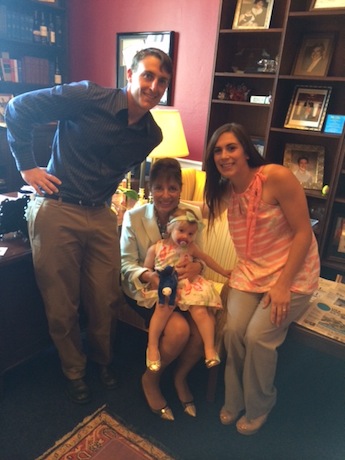 Related Articles
Related Articles

White House Summit Tackles
|
 |
| San Mateo, Calif., Local 617 member Krista Brooks, right, with her family at the June 23 White House Summit for Working Families.
|
These issues are among many that President Obama, Vice President Biden, and other distinguished labor rights activists and speakers addressed on June 23 at the White House Summit for Working Families in Washington, D.C., co-hosted by the U.S. Department of Labor and the Center for American Progress.
“For many workers, taking just a few days off can mean losing their job,” Obama said. “And even though unpaid family leave is available, if you can’t pay the bills already, the idea of taking a couple days off unpaid may mean you can’t make the mortgage payment or the rent payment at the end of the month.”
These are basic necessities that IBEW members do not take for granted. Krista Brooks and her husband Johnathon of San Mateo, Calif., Local 617 attended the summit with their 18-month-old daughter Savina. Brooks was only three months pregnant when her condition required her to take disability leave from her work in Local 617’s electrician apprenticeship program. She and her husband were both able to take paid family leave to spend time with their newborn daughter.
“We talked about how the IBEW was supportive, and our contractor helped us and made it easy to take the leave, and be able to spend that time,” Brooks said.
Brooks recently graduated from the apprenticeship program. She and her husband, in his third year of the program, are fortunate enough to have childcare assistance from family members in the area, four of whom are also Local 617 members.
Brooks said she was glad for the chance to represent the IBEW at the conference. “The word’s getting out – more people are realizing that we need to come together as unions and stand up for what we need as families,” said Brooks. “Families are changing now. They’re not what they were 20 years ago.”
Liz Shuler, secretary-treasurer of the AFL-CIO, also emphasized the benefits of unions in the wake of these increasing difficulties.
“It’s kind of risky, sometimes, asking for these things – if you don’t have the protection of a collective bargaining unit or a union,” Shuler said. “Coming together collectively and exercising your voice to give you more strength and protection is what unions are all about.”
Congress has yet to update many family-friendly policies – and a lot of major businesses are reluctant to meet the needs of families on their own, claiming it would hurt them financially.
“This notion that raising wages and having family-friendly policies is not competitive is just hooey,” said Mary Kay Henry, president of SEIU. “We know that when people are able to spend money in their community, the economy gets better for everyone again.”
Studies by the Department of Labor show that flexibility for working families makes sense for business. Bob Moritz, senior partner of PricewaterhouseCoopers, has firsthand experience with this trend.
“We went unlimited with paid sick leave four years ago,” Moritz said, explaining that the firm’s definition of sick leave went well beyond the individual, extending to the care of children and the elderly as well. “What’s really interesting is, the average amount of sick days went down. When you combine a change in policy with more flexibility, you actually got more productivity, which impacted the bottom line.”
President Obama emphasized the responsibility of activists to raise their voices, of CEOs to change their policies and of state leaders to change legislation where Congress has not.
“Family leave, childcare, workplace flexibility, a decent wage — these are not frills, they are basic needs,” he said. “They shouldn’t be bonuses. They should be part of our bottom line as a society.”
To see the full coverage of the event, click here.
Photo used under a Creative Commons License from Flickr user Shubert Ciencia.
Related Articles
2014 IBEW Women’s Conference Sept. 17-20
Empowering Women, Building IBEW
![]()